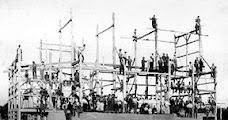Wednesday March 14, 2012 What are the cornerstone principles of engagement when working with groups? The same headache always arises. It doesn't matter if you are working to lead a group in an action learning set, a strategic planning session or in a teambuilding retreat: the principles of engagement are elusive, making this work an art more than a technique. Its tentative, improvisational, error-prone nature reminds us of the experience of "flow"... but doesn't' help us clarify it. I see groups as living systems and my work through the lens of service to the whole. As such sometimes I wonder: Why should I create engagement? What is engagement really telling me about the group? If I interpret engagement as success, whose success am I talking about? Mine? What if – more humbly – I simply focus on knowing what is really going on "deeply" in a group, drop my concern, and stop influencing a group towards engagement? What if I try to work on a deeper awareness of where the group is instead? With this perspective, I have found that my observation skills are greatly improved if I work with the concept of the four "flows." Inspired by David Sibbet, those are great and simple ways I use to improve my awareness and my ability to diagnose what is really happening in a group. back to top  While working with groups is not a mathematical equation that can be solved in a distinct way, I believe that raising the quality of my awareness in groups is possibly the best and most honest help I have to offer. The four flows of Operations, Communication, Energy and Intuition can help you do it. The flow of OPERATION concerns all the logistical, control-oriented parts of a process, all the decisions, commitments, and constraints of the work: design choices made with the client, methodologies , time allocations, agenda, recording equipment, room set-up, the invitation sent to attendees. In other words this is the ground zero of the work, the one that, if done right, frees your attention and energy for more important things. To manage this flow you need to be effective in coordinating and planning the session. Key questions: · What work before the session will contribute to the success of the meeting? · Have I embraced all the constraints of this work as an opportunity for creativity? The flow of COMMUNICATION concerns all the information, stated meeting roles and objectives, expectations, reflections, critical thinking, languages, artifacts, graphic recordings, and all the explicit communication taking place in a session. In other words this is the domain that is most visible and is where people pay most attention in meetings. To manage this flow you need to stay focused on the processing of the group as well as on the information being shared. Key questions: · Is everyone on the same page? · What do we need to unlearn to proceed? · Are we learning together? The flow of ENERGY concerns feelings, emotions, excitement, frustrations, and so on. This flow is hard to manage as it ebbs and flows through the pace of the sessions and the physical movements of the people. To manage this flow you need to be in it yourself or be on the sidelines creating opportunities for its movement through structured experiences. Key questions: · What's the feel of this group right now? · Where is the quality and direction of it? · What is the quality of participation? The flow of INTUITION concerns the intention, attention, and consciousness of the work in group. To manage this flow you need to be aware and centered in the complex field of a group in session. Done right this flow has the power to inspire, direct, and move group attention. Key questions: · Am I being present for this group right now or am I hiding/overpowering? · Am I open to the possibilities of this group without judgment? · Is the group tapping into its own collective intelligence? There you have it! I hope you find this helpful for your day-to-day work in teams and groups. I look forward hearing from you. | ![]()





